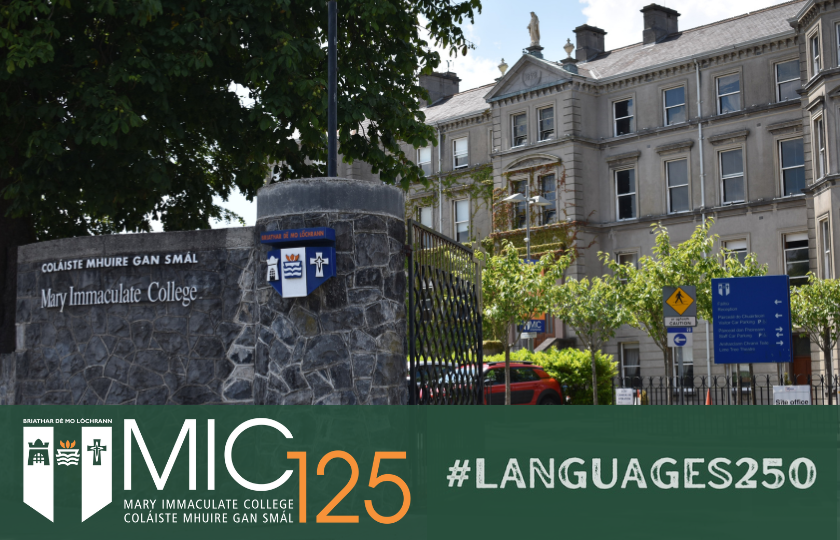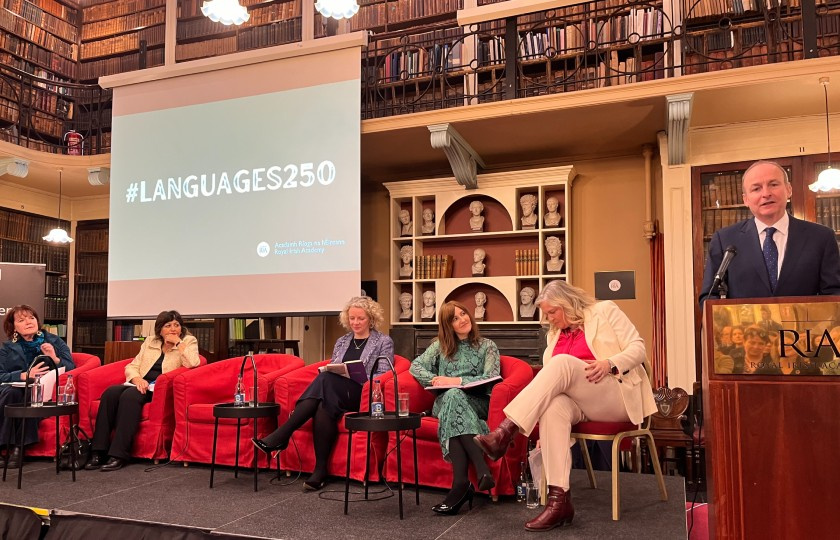
To celebrate ‘Towards 250 Years of Modern Languages at Third Level’ on 26 September, Mary Immaculate College’s social media accounts highlighted the dedicated Languages 250 - YouTube channel, with videos outlining the importance of language learning in Irish Higher Education.
Part of this initiative is to draw attention to the fact that MIC and the University of Limerick will co-host the third in a series of landmark annual events in November 2025 to highlight the importance of Modern Languages as a discipline in Ireland. This event series is organised by the Royal Irish Academy’s Languages, Literature, Culture and Communications Committee (LLCC) and the higher education institutions in Ireland.
Dr Sabine Egger, from the Department of German Studies at MIC, sits on the Royal Irish Academy Committee for Languages, Literature, Culture and Communication and is a founding member of the #Languages250 working group. She explained the significance of MIC’s involvement in the project:
“#Languages250 is a key initiative regarding Modern Languages and their importance for Ireland, both north and south. Ireland can boast of having the longest tradition of modern language teaching at third level in the world. This has played an important role for Ireland, culturally, politically and economically. After all, Joyce’s Ulysses is the work of a plurilingual author, not to mention Ireland’s economic success story in an international context. To maintain this standard, we must ensure that learners of all ages are given access and support in language learning, from their parents as key influencers, and from the education sector.
The introduction of foreign languages in the Irish primary school curriculum from 2025 is a vital step. Training sufficient numbers of qualified language teachers for primary and post-primary level, will be a further challenge. As joint organiser of the Limerick event, together with Prof. Gisela Holfter from UL, I am looking forward to helping to provide a forum to discuss these topics, bringing together decision-makers, researchers, practitioners and learners. The event, supported by Modern Languages Departments and research centres in MIC and UL, will take into account language learning at primary and secondary level and the international context, with a focus on migration."
Dr Egger added that the event will be aimed at a broad audience including schools, students and parents, not least because language learning begins at the earliest stages in education. This is also highlighted in the keynote address by Minister of Foreign Affairs and Tánaiste, Micheál Martin (watch below)at the #Languages250 launch event last December, which is accessible on the #Languages250 YouTube channel – one among a number of statements from politicians, businesspeople and scientists on why languages matter.
Prof. William Leahy, Dean of Arts at MIC, commented: “I am delighted that the Faculty of Arts and colleagues from MIC are joining this discussion, and sharing their expertise in this forum. Being part of this initiative represents the College as a place of teaching, learning and research in the field of Modern Languages. The upcoming joint MIC-UL event in 2025 is a very exciting prospect and we are looking forward to welcoming attendees to Limerick.”

The first university positions in French, German, Italian and Spanish were established in Trinity College Dublin in 1776. To celebrate this major milestone, and create a stronger awareness of the importance of languages, the Limerick conference in 2025 will build on insights gained at the RIA launch in 2023, as will the next event, taking place on 29 November 2024 at Queen’s University Belfast, followed by the anniversary celebration at Trinity College Dublin in 2026.
The videos will also be available on the RIA website and the Irish government-led initiative, Languages Connect. They will be shared by cultural institutes and embassies and institutes of Higher Education across Ireland both to celebrate the European Day of Languages and raise public attention to the importance of language learning.



